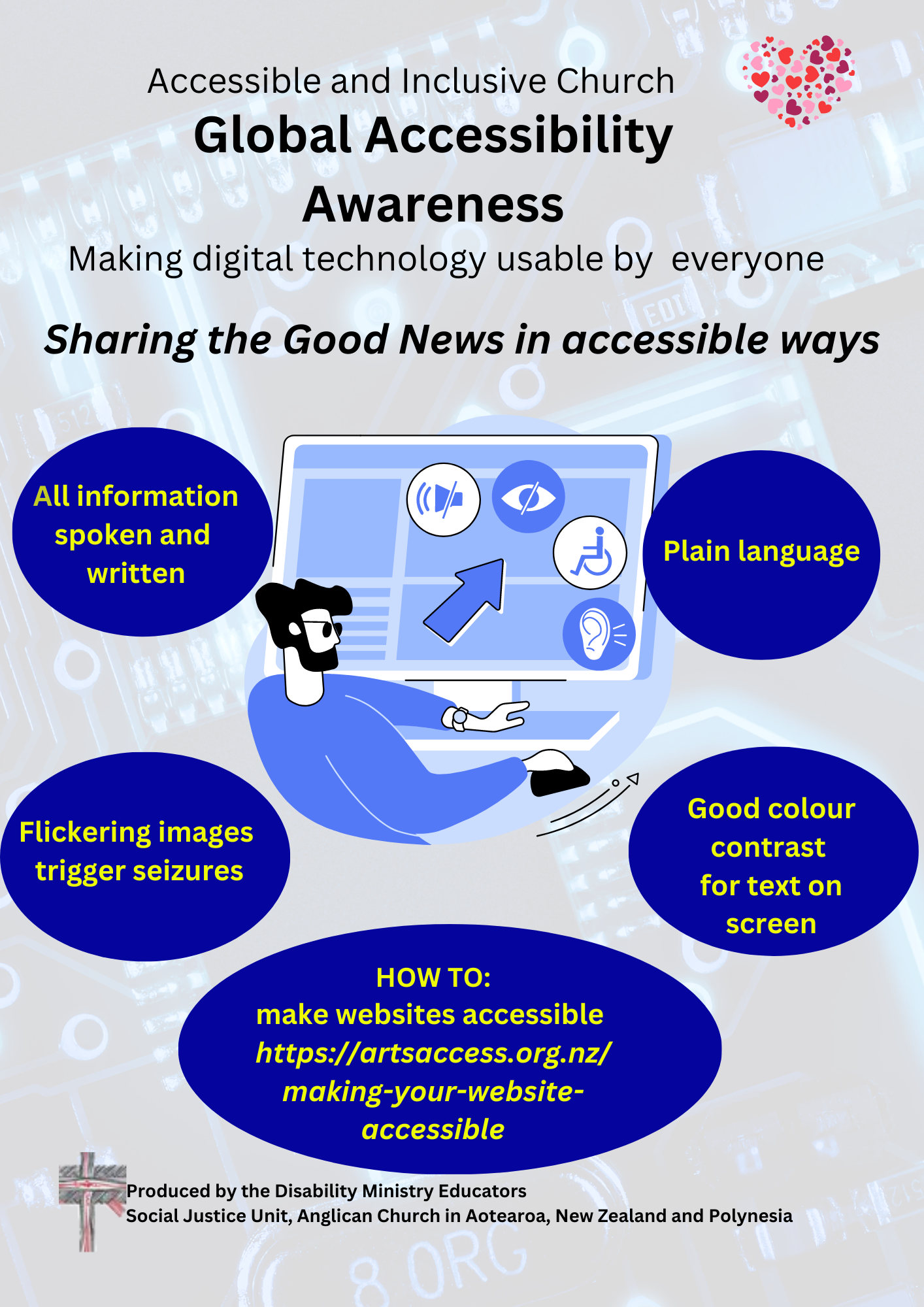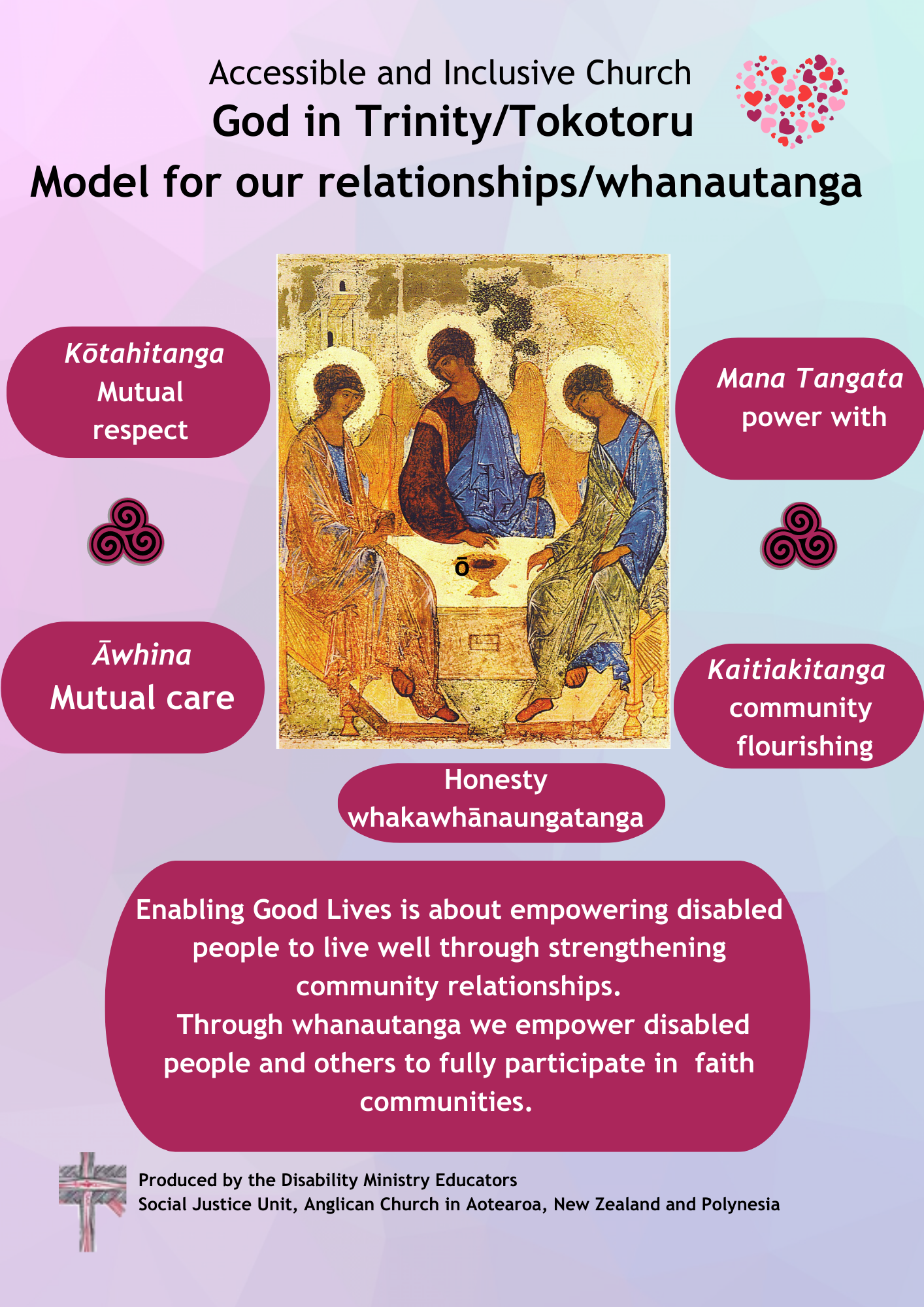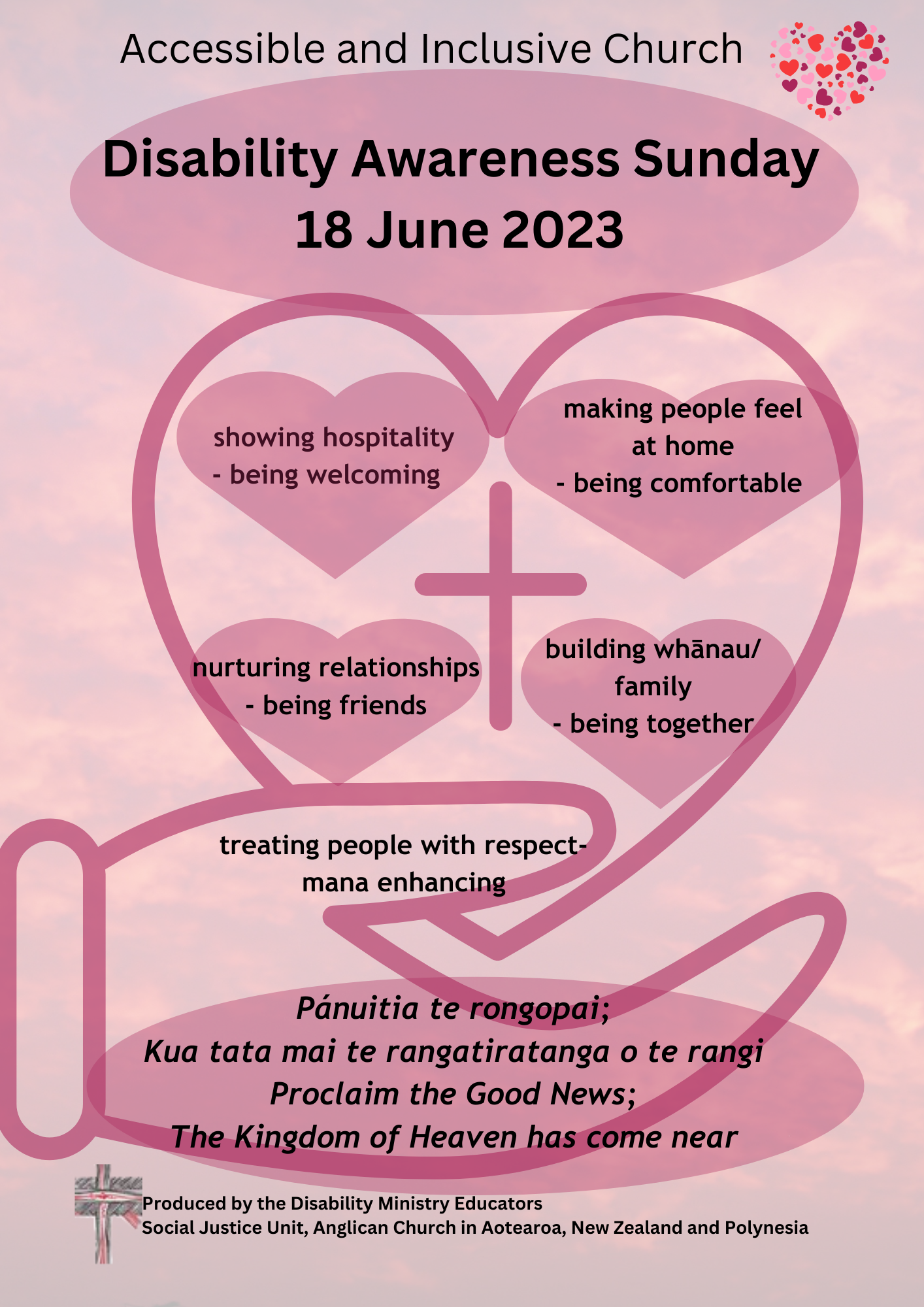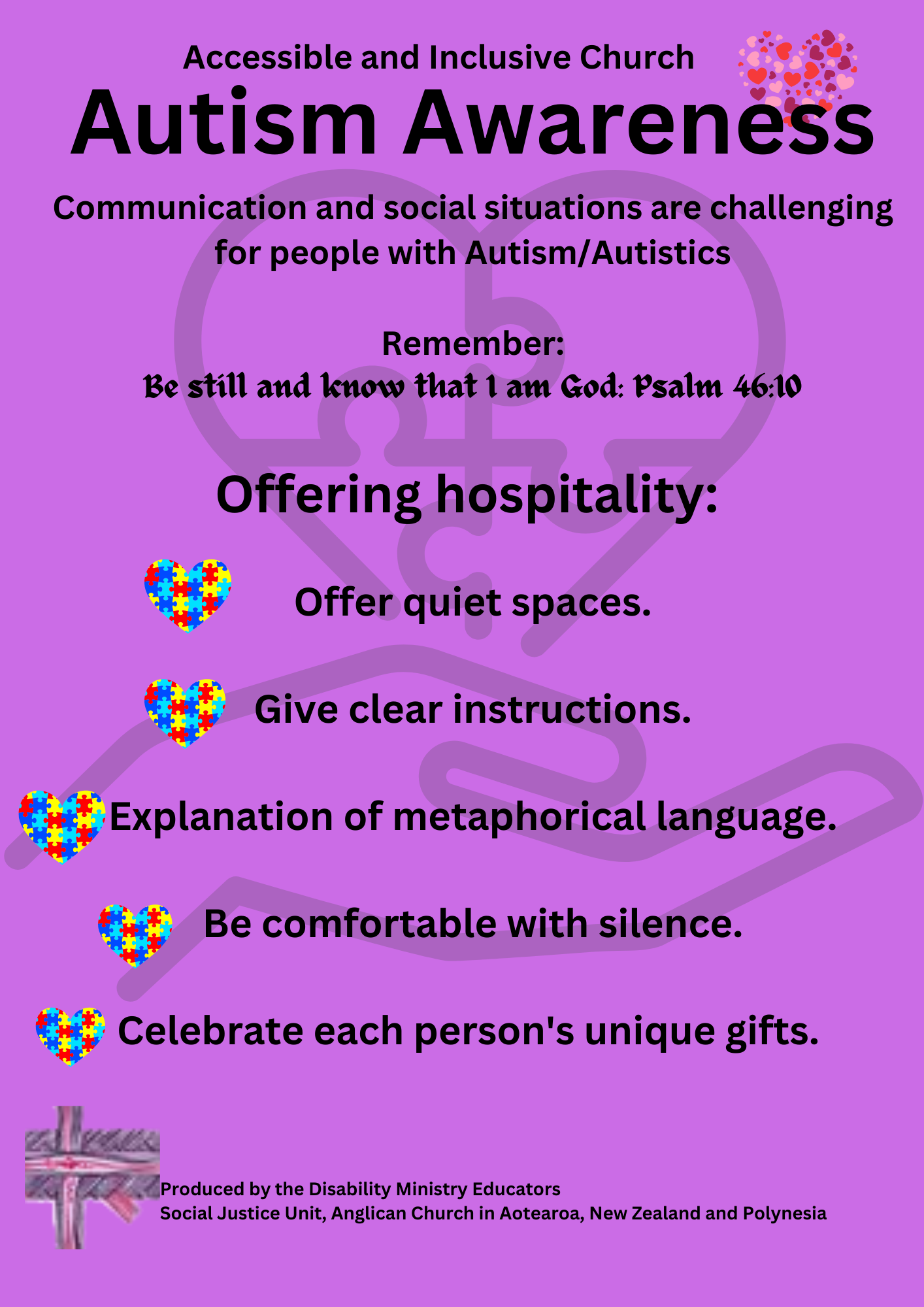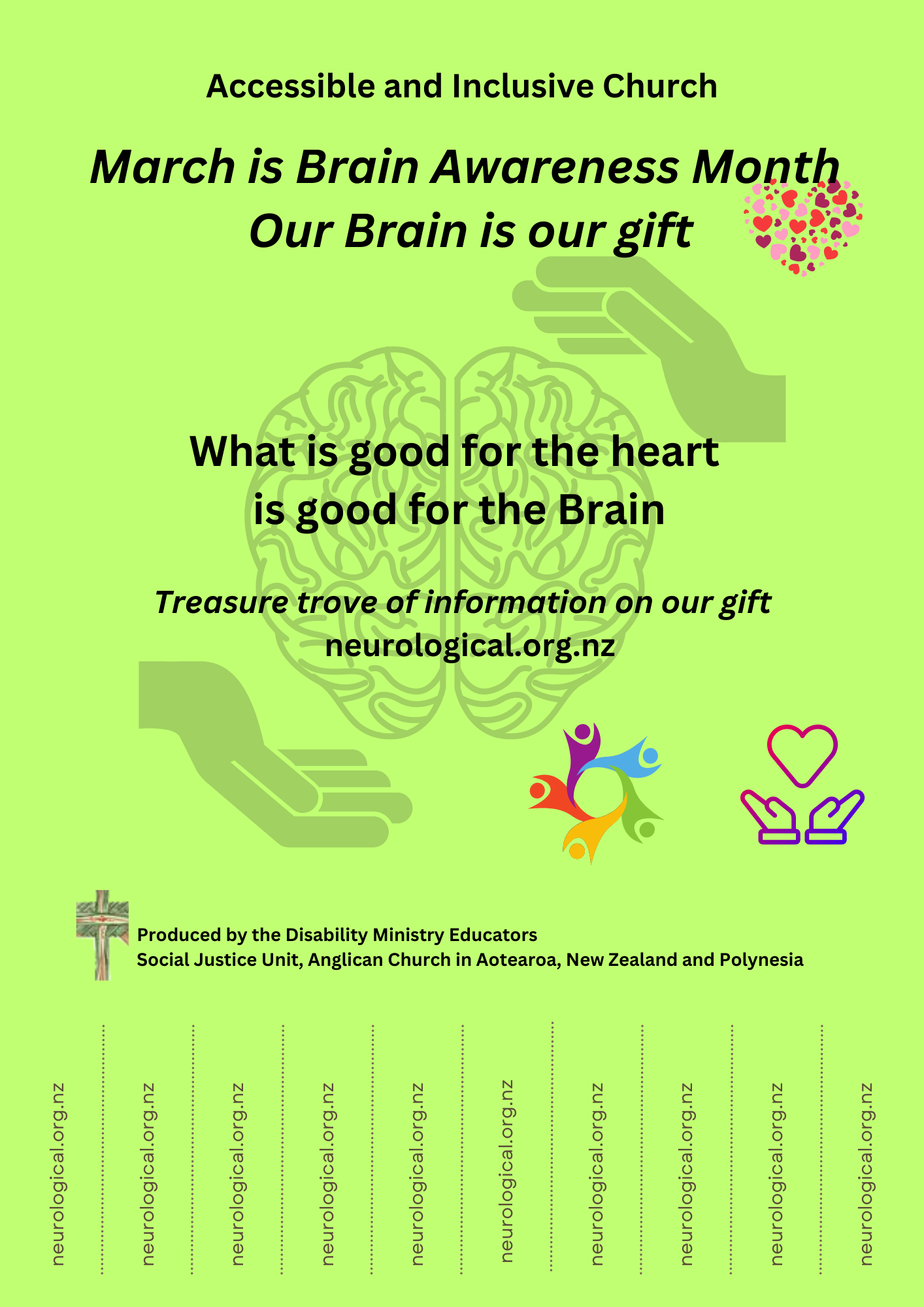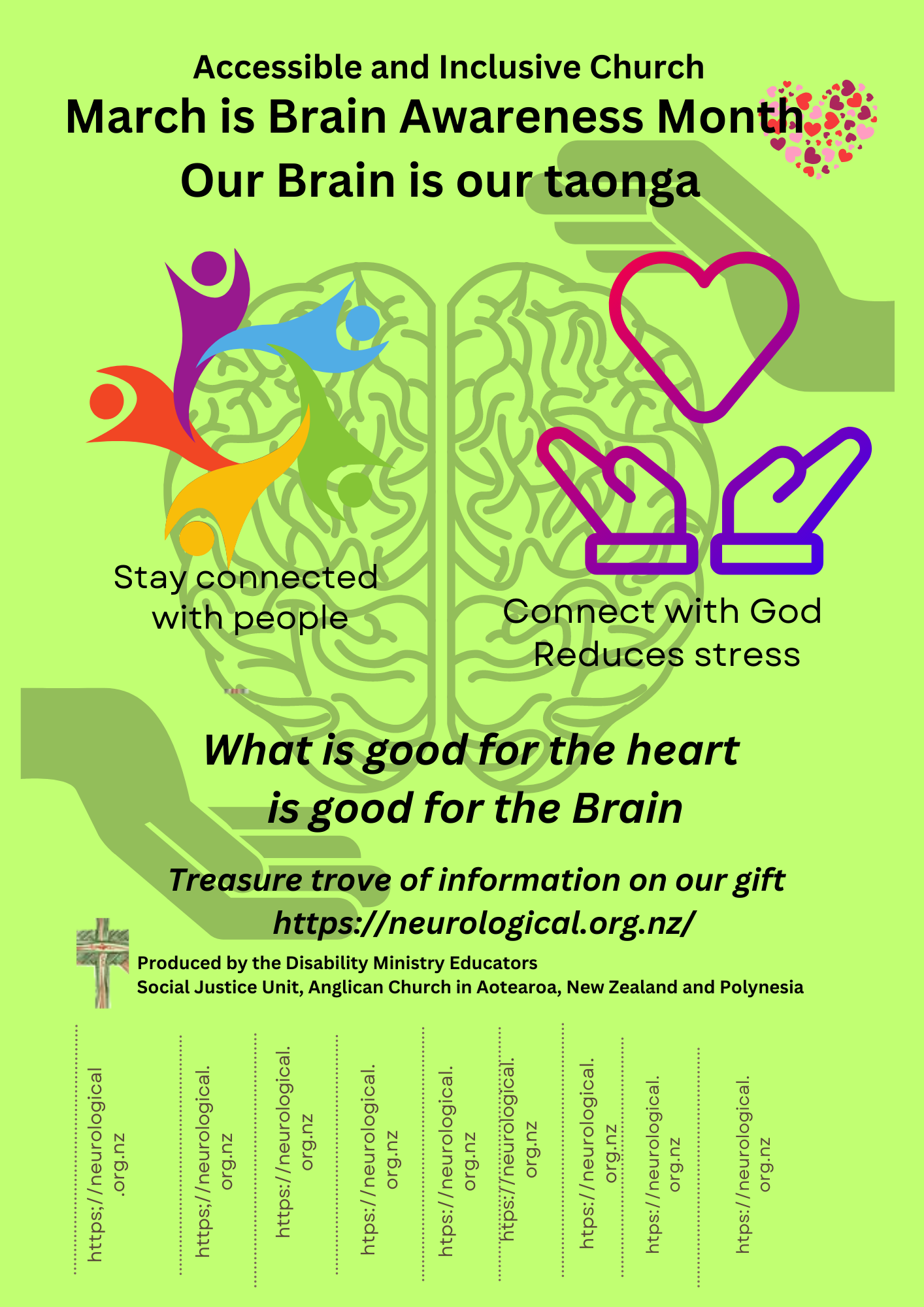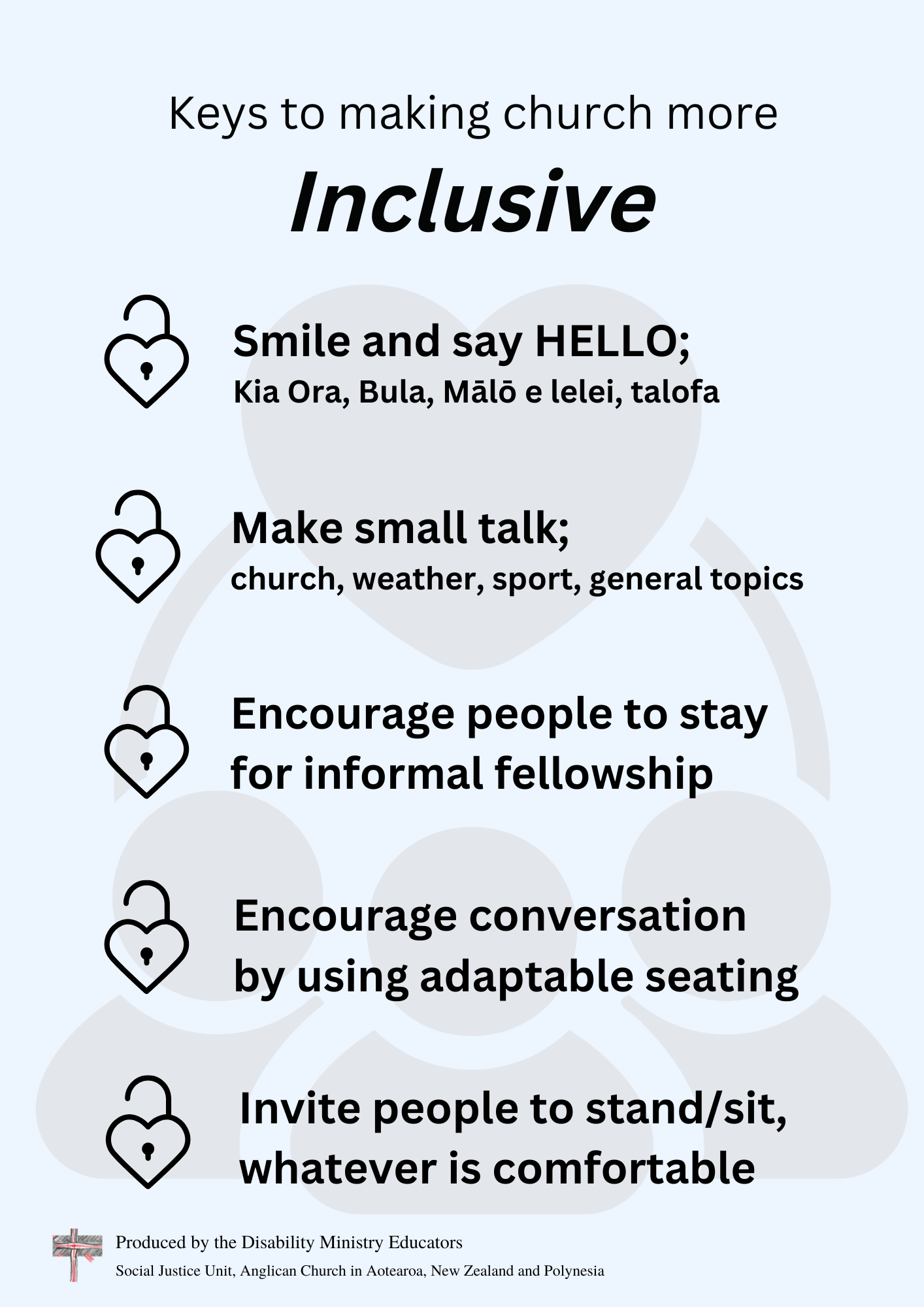FROM BEING "THEM AND US" TO BEING "US TOGETHER"
---
FROM BEING "THEM AND US" TO BEING "US TOGETHER" ---
Accessible and Inclusive Churches
Rēneti/Lent 2024 (2)
Kia ora, Greetings, Bula, Malo, Talofa, Namaste -
We are in the midst of Rēneti/Lent. This 2nd package from Disability Ministry Education invites people to continue to reflect on the reality of living in our bodies.
The main theme is “How to live more fully.”
Impairment/disability is often seen as wholly negative. However, living with limitation is part of being human. Experiencing our limitations can lead us into life on a deeper level. Sharing these experiences can help us all become aware as to how limitations/impairment are gifts to our communities.
It is hoped that these posters may encourage korero/discussion/talanoa around how do we regard our bodies as part of God’s good creation.
In this package there are posters for Lent4; Lent 5; Rātapu Nīkau/Palm Sunday; Taite Mone/Maundy Thursday; Paraire Pai/Good Friday; Te Rā o te Aranga/Easter Day
We welcome any feedback you may want to give on these resources.
Please contact: Revd Vicki Terrell disabilityresources@anglicanchurch.org.nz or
Cherryl Thompson disabilityengagement@anglicanchurch.org.nz
We are available to come and meet with groups.
Accessible and Inclusive Churches
Rēneti/Lent 2024
Kia ora, Greetings, Bula, Malo, Talofa, Namaste -
Rēneti/Lent is upon us. Disability Ministry Education is inviting people to reflect on the reality of living in our bodies as God’s creation.
The main theme is “How to live more fully as God’s creation.”
Impairment/disability is often seen as wholly negative. However, living with limitation is part of being human. Experiencing our limitations can lead us into life on a deeper level. Sharing these experiences can help us all become aware as to how limitations/impairment are gifts to our communities.
It is hoped that these posters may encourage korero/discussion/talanoa around how do we regards our bodies as part of God’s good creation.
In this package there are posters for Ash Wednesday; Lent 1; Lent 2 and Lent 3. There will be another package of posters in the next couple of weeks.
Please contact: Revd Vicki Terrell disabilityresources@anglicanchurch.org.nz or
Cherryl Thompson disabilityengagement@anglicanchurch.org.nz
We are available to come and meet with groups.
Accessible and Inclusive Churches
Meri Kirihimete! Merry Christmas! Marautaki ni Siganisucu!
Kilisimasi Fiefia! Manuia le Kerisimasi! Christmas ki Shubhkamnayein!
Our Christmas package has a poster to welcome people and an information sheet has some ideas as to how to make Christmas church, more accessible to, and inclusive of all people.
Please contact: Revd Vicki Terrell disabilityresources@anglicanchurch.org.nz or
Cherryl Thompson disabilityengagement@anglicanchurch.org.nz
We are available to come and meet with groups.
Accessible and Inclusive Churches
Tena Koutou, Talofa Lava, Bula, Greetings
December 10th Human Rights Day
This year we celebrate the 75th Anniversary of the signing of the United Nations (UN) Declaration of Human Rights.
This package introduces the UN Convention on the Rights of Persons with Disabilities which sets out how Human Rights of disabled people are upheld.
Please contact: Revd Vicki Terrell disabilityresources@anglicanchurch.org.nz or
Cherryl Thompson disabilityengagement@anglicanchurch.org.nz
We are available to come and meet with groups.
Disability Ministry Education
Accessible and Inclusive Churches
Tena Koutou, Talofa Lava, Bula, Greetings
International Day of People with Disabilities- December 3rd
Happy New Year- Advent Sunday
In this package there is a variety of material:
· International Day of People with Disabilities Poster
This poster focuses on physical mobility issues.
· Access Assessment Form for your church is included. (Scroll down page to find)
Maybe filling in the form could be an all-age activity for your ministry unit. This could spark interesting discussions about what it means to be accessible and inclusive at Church.
· New Zealand Disability Strategy Poster
Aotearoa New Zealand has a disability strategy. It has been developed with the disability community. It recognises that all people have a part to play in becoming a more accessible society where all people are valued and can fully participate.
· Included Across Our Church
The first edition of the disability ministry educator newsletter.
If you would like to be on our mailing list, please email Disabilityresources@anglicanchurch.org.nz
Please contact: Revd Vicki Terrell disabilityresources@anglicanchurch.org.nz or
Cherryl Thompson disabilityengagement@anglicanchurch.org.nz
We are available to come and meet with groups.
Included Across Our Church:
Newsletter of the Disability Ministry Educators
No 1 Advent 2023
Disability Ministry Educators: Revd Vicki Terrell (left) Cheryl Thompson (right)
Here is some news of what we have been doing this year, Vicki has been developing resources while Cherryl has been leading out our engagement with the church.
Greetings, Kia ora, Bula, Malo, Talofa, Namaste -
Our Vision is:
to provide Educational and Operational leadership for the ongoing work of Disability Ministry in the Anglican church of Aotearoa, New Zealand and Polynesia
Every quarter of the year we will be highlighting recent resources, reporting on the various forums of the church we have contributed to and listing all planned visits in the months ahead.
Here is some news of what we have been doing this year, Vicki has been developing resources while Cherryl has been leading out our engagement with the church.
Accessible and Inclusive Church Posters
The Disability Ministry Education has produced posters to help the church to become more accessible and inclusive of disabled people. Currently there are over 20 posters on a range of topics from disability biblical heroes to hearing hospitality to neurodiversity. Please let us know if you would like a poster and/or information on a specific topic.
Posters can be found on the Anglican social justice website: Disability Ministry Resources — Social Justice Unit (anglicansocialjustice.nz)
Anglican Theological statement on Disability
A theological statement on disability is being developed by our church. A draft statement was put out in June, and we hope that people will take the opportunity over the next six months to talk about it and provide feedback.
Here is a summary of the statement:
Disability is part of human experience. Disabled people bear the image of God. We commit to fully include all people, that together we may become more fully the Body of Christ. Disability reminds us of the diversity of our humanity. Disabled people are full participants in the Body of Christ.
Full text of the statement can be found on the website:
Disability Ministry Resources — Social Justice Unit (anglicansocialjustice.nz)
We hope to have some zoom hui in February and March to discuss the statement, if you are interested in attending or wish to give feedback please email: disabilityresources@anglicanchurch.org.nz
Disability Ministry Goes to Camp
Cherryl Thompson visited The Abbey – Tikanga Pakeha Youth Conference, held at El Rancho to see just what goes on in camp!
While there, Cherryl was able to assess the environment for inclusive camps in the future. Wouldn’t it be great to see more disabled youth at our annual camps? if you’re thinking of attending next year’s event.
contact Cherryl: disabilityengaement@anglicanchurch.org.nz
Rūnanga nui – Five Amorangi of Aotearoa
The Two-Yearly Māori Anglican Conference
At the end of September, Cherryl Thompson was invited to person a stall on disability to a substantial Māori Anglican Conference in Hastings, Hawke’s Bay. Leo Te Kira, Member of the Portfolio Group governing the Disability Ministry Team met up in Hastings with Cherryl and other clergy and lay people attending the Hui.
Cherryl writes:
Let’s get some kōrero around theology and terminology from a Māori perspective. We received some great feedback, making connections with other educators to share our message of Inclusion and Accessibility.
Theological Colloquium: Identity and belonging in the Anglican Church in Aotearoa, New Zealand and Polynesia
At the end of September, Rev Vicki Terrell presented a paper to the theological colloquium at St. John's theological college Auckland.
Vicki presented on the draft theological statement of disability inviting the church to be more fully the body of Christ. The paper was well received with good feedback. People commented that they haven’t really heard of this theology. It was significant that two other papers touched on disability. Perhaps this is a new movement of the Spirit in our church.
There were papers on identity and belonging in the church from many voices. What is obvious is we as church need to work on our relationships at all levels with values of whanaungatanga, manaakitanga and mana so that all people are honoured, have sense of belonging and justice is done.
If you would like more information or a copy of Vicki’s paper, please email: disabilityresources@anglicanchurch.org.nz
Many Hands: He Ringa Awhina
At the beginning of November, both Cherryl and Vicki attended the Anglican Women’s Studies Hui. Cherryl was a guest speaker at the session “He Ringa Awhina” helping women think about disability in new ways. Vicki supported her with the theological statement. Outside the session there were opportunities to share and affirm the ways the hui was inclusive. It was interesting to note we all used the accessible entrance to the church as it was more convenient from the marae where we were sleeping and eating. The communication technology enhanced the sessions making them easily accessible. We introduce sign language to the song “Te Aroha, Te whakapono, me to rangimarie, Tatou, Tatou e”. This was warmly embraced. We took some posters, and they were snapped up by the participants.
“The chance to interact with one of the church’s more established and experienced sector groups was an opportunity we will always both value”.
Disability Information
Where do I find?
Assessment and Funding:
Needs assessment services | Whaikaha - Ministry of Disabled People
New Zealand Disability Strategy:
New Zealand Disability Strategy 2016-2026 - Office for Disability Issues (odi.govt.nz)
Enabling Good Lives:
System Transformation and Enabling Good Lives | Whaikaha - Ministry of Disabled People
UN Convention on the Rights of Persons with disabilities:
https://www.odi.govt.nz/united-nations-convention-on-the-rights-of-persons-with-disabilities
Keeping in touch
We are creating a database for the Disability Ministry in the Anglican Church:
If this is the first time you have received the newsletter, please email disabilityresources@anglicanchurch.org.nz
· if you would like to continue receiving information.
· If you do not want to receive newsletter and other information
Contacting us:
For Cherryl Thompson who is the Engagement Facilitator
Email disabilityengaement@anglicanchurch.org.nz
For Vicki Terrell who is the Resource and Development Facilitator
Email disabilityresources@anglicanchurch.org.nz
Accessible and Inclusive Churches
Tena Koutou, Talofa Lava, Bula, Greetings
Please find below six posters:
· Down Syndrome
October is Down Syndrome Awareness month. It is good to be aware of how we can assist people with Down Syndrome to be part of the church.
· Cerebral Palsy (CP)
In October World Cerebral Palsy Day was on 6th and it is the Appeal month for the Cerebral Palsy Society in New Zealand “Be seen, be green”. The Society supports people with CP to reach their potential and have independence, freedom and choice. CP is common and very varied. It helps to be aware that some people may use a variety of ways to communicate, and people are encouraged to listen.
· Vision Environment.
World Sight Day is October 10th. It is a good opportunity to think about what can help make our visual environment accessible as possible for all people.
· Neurodiversity Awareness Cover
There is a growing awareness of Neurodiversity within our society. These three posters help with understanding. Neurodiversity covers a range of conditions, some of which are listed here.
· Neurodiversity Awareness Key terms
Key terms are important to help with understanding.
· Neurodiversity Awareness church actions
Action that churches can take to provide an accessible and inclusive environment for neurodiverse people.
Please contact: Revd Vicki Terrell disabilityresources@anglicanchurch.org.nz or
Cherryl Thompson disabilityengagement@anglicanchurch.org.nz
We are available to come and meet with groups.
Accessible and Inclusive Churches
Tena Koutou, Talofa Lava, Bula, Greetings
Please find enclosed two posters and a book review.
In September, a couple of important weeks are marked throughout Aotearoa New Zealand:
Te Wiki o te reo Māori (September 11-17)
Mental Health Awareness (September 18-24)
Also, there is a book review of At the Gates: Disability, Justice and the churches. It is highly recommended reading for people who are wanting to understand how disability is an issue of justice for our church.
Please contact: Revd Vicki Terrell disabilityresources@anglicanchurch.org.nz or
Cherryl Thompson disabilityengagement@anglicanchurch.org.nz
We are available to come and meet with groups.
At the Gates: Disability, Justice and the Churches
By Naomi Lawson and Emily Richardson
London; Darton, Longman and Todd:2022
Reviewed by Revd. Vicki Terrell who is a disabled priest.
Professor John Hull, to whom this book is dedicated, saw disabled people as “not so much as a pastoral problem as prophetic potential” for the church. This is at the core of the book- disabled Christians are prophets calling the church to be more fully the body of Christ where all people are embraced in all our humanity.
At the Gates: Disability, Justice and the Churches brings together 10 years of research among disabled Christians in England in an easy to read book which challenges churches to take the experience of disabled Christians seriously. The authors interweave many voices of disabled Christians who are the storytellers, in all aspects of church life from access and participation to reading scripture, healing and being the body of Christ. The book has extensive endnotes and a full glossary of both church and disability terminology to help navigate some complex ideas.
A central question raised in the book is, can ableism in the church be interrupted so God’s grace can make space for all God’s people?
It is often common for churches to say everyone is welcome however many disabled people do not feel particularly welcome and included because of the effort of trying to fit into a community that does not cater for their needs.
This book may make some people uncomfortable with its direct challenge to the church about the ways disabled people are excluded and feel that they do not belong. For too long disabled people have been cast as a “pastoral problem” rather than welcoming the lived experience of disabled people as having “prophetic potential” to provide a new vision of ministry “with” rather than “for” disabled people.
Pastoral Care has often focussed on caring for disabled people in the church. In the process of caring, the witness of disabled Christians has been silenced. A pastoral care model assumes that disabled people require to care for by the church rather than empowering disabled Christians in providing help to embrace a new way of being Church where all people are able to offer gifts and be interdependent in whole Body of Christ.
Disability theology created by non-disabled people often focuses on how disabled people can be reached or how they can be inspirational figures of faith for non-disabled people. By contrast theology created by disabled people focuses on the lived experience of disability and what insights these may bring to theological discourse.
Bringing the experience of disabled people into reading scripture illuminates the embodiment of the text that is often missing from our pulpits and study groups. As most disabled people do not have the luxury of ignoring their bodies, the embodiment of the text becomes alive in new ways. This understanding of embodiment brings deeper insights into the incarnation. Jesus, in resurrection, becomes the disabled God bearing scars of crucifixion. The upside-down nature of the Kingdom of God challenges the disability injustice within the church and society.
The chapter, “Fearfully and wonderfully made” is an excellent exploration of healing. Healing can be a source of deep hurt for disabled Christians because well-meaning people sometimes will focus on the impairment rather than responding to direct prayer request from the person. At times, disabled people have had prayers for healing prayed over them without their consent. The focus of this chapter is that the church needs healing from ableism. It calls for a deeper more holistic way of healing, we all want to be able to flourish.
Near the end of the book there is a discussion on faith communities of disabled Christians. It also examines the validity of faith communities on-line. For some disabled Christians being able to attend online may be the only way they can be involved in a faith community. There is regret that the lessons from Covid, where disabled people felt much more part of faith communities, has not been learnt and once again disabled people find themselves on the margins of the church.
Click immediately below for a resource (Access Assessment Form) to enable any place or space within the Anglican Church in Aotearoa New Zealand and Polynesia to use as a self assessment tool.
This form is to be used to assist you to be more AWARE of how we might make our physical environment more ACCESSIBLE and therefore INCLUSIVE and welcoming.
You could try this on your own, or contact Cherryl to guide you through:
Cherryl Thompson disabilityengagement@anglicanchurch.org.nz
Accessible and Inclusive Churches
Tena Koutou, Talofa Lava, Bula, Greetings
Please find below a poster on “A theological statement on Disability in the Anglican Church in Aotearoa, New Zealand and Polynesia”. The poster summarises key concepts in the statement along with the aim of fully including all people in the church.
It is hoped this poster will be put up in churches to promote discussion around the statement. The statement is a living document, see further below, and we invite people to give feedback on it.
Please contact: Revd Vicki Terrell disabilityresources@anglicanchurch.org.nz or
Cherryl Thompson disabilityengagement@anglicanchurch.org.nz
We are available to come and meet with groups.
A theological statement on Disability in the Anglican Church in Aotearoa, New Zealand and Polynesia
As Anglicans, we believe that each person is made in, and bears the image of God. We believe that through our baptism we are all ministers of the Gospel as members of the Body of Christ. As human beings, we all live within the diversity of humanity, yet by God’s grace we are given gifts for building up the Body of Christ and building the Kingdom. Because disability is part of our human experience, disabled people also bear the image of God, and by virtue of baptism, are partners in the mission and ministry of the church.
In Scripture we see that personal impairments need not be a barrier to answering God’s call. For example, when Moses protested to God about his calling, citing his speech impairment as a barrier to ministry, he was supported in his calling by Aaron (Exodus 4:10-17). The story of Moses challenges our assumptions about independence and autonomy in relation to ministry and reminds us that impairment need not be a barrier to it. In the incarnation, Jesus’ humanity, in his life, death and resurrection, challenges and gives hope that, in vulnerability as well as in strength, we are called to be bearers of the Gospel and full participants in the Body of Christ.
We recognise that some understandings of disability can create stigma and ultimately exclusion from full participation in the life of the church. We also recognise that the concept of healing can be challenging in the context of disability. When Jesus healed in the Gospels, it always included people being restored to their community. We affirm that healing can be experienced as full inclusion in the life of the community of faith. Healing can also come from being loved and accepted for who we are, in all our diversity in the community of faith, and being invited as full members to contribute to the ministry of that community. The community becomes whole when we all work together, and thus reflecting the relationship between the three persons of the Trinity.
We affirm that we want to live out the Gospel in ways that are mana-enhancing for all. As a church we therefore commit ourselves to the principles of manaakitanga as we foster a culture of full inclusion. We are committed to pathways of education and advocacy to nurture a culture of faka'apa'apa/highest respect and tauhi va'/healthy relationships for our mutual flourishing. Manaakitanga is expressed not just in our community life, but also extends to the way we structure our environments to be accessible to all. The need for physical access is understood as a matter of hospitality and inclusion for all people.
In the Anglican Church in Aotearoa, New Zealand and Polynesia we commit ourselves to offering space to learn from the experiences of disabled people. Disability reminds us of the diversityof our humanity and our need for one another as the people of God. We affirm the mana of all people, regardless of their experience of being human. We are committed to the full inclusion of all people as God’s image-bearers and full members of the church, that together we may become more fully the Body of Christ.
(19 June 2023)
Accessible and Inclusive Churches
Tena Koutou, Talofa Lava, Bula, Greetings
Here are two posters that enable us to welcome people who may find church challenging in different ways, some simple ways to include others in our community and celebrate our diversity.
People with learning disability/ intellectual disability
Here are some ways to be a good communicator.
Sharing the Peace
August 6th is marked in the Lectionary as World Peace Day because it is the day when the first atomic bomb was dropped on Hiroshima in 1945. World Peace Day is about making and sharing peace.
World Peace Day has a wider focus than just our personal life, but peace is brought into personal focus each time we share the peace prior to communion. It is being in right relationship with people we are sharing Communion with. While it is common practise to hug or shake hands, for a variety of reasons some people may find this practise uncomfortable. Here are some alternative ways to share the peace in ways that includes us all.
All posters are on the website:
Disability Ministry Resources — Social Justice Unit (anglicansocialjustice.nz)
We welcome your feedback as to how useful these resources are. We also welcome any suggestions you have on how these resources can be improved and/or any topics you would like to see covered in this project.
Please contact: Revd Vicki Terrell disabilityresources@anglicanchurch.org.nz or
Cherryl Thompson disabilityengagement@anglicanchurch.org.nz
Accessible and Inclusive Churches
Tena Koutou, Talofa Lava, Bula, Greetings
National Bible Sunday
This poster is a resource to help you to reflect on disability in the bible in ways that maybe new to you.
Disability is based on social norms and expectations.
Women being barren in the bible could be considered as being disabled because of societal expectations around women and family structures. Being barren carried a sense of shame and was often regarded as a sign of God’s disfavour.
We believe that no matter how society judges family / whanau structures and the roles that are held within them, God’s purposes are achieved with people who are open to God’s love, no matter social status.
All posters are on the website:
Disability Ministry Resources — Social Justice Unit (anglicansocialjustice.nz)
We welcome your feedback as to how useful these resources are. We also welcome any suggestions you have on how these resources can be improved and/or any topics you would like to see covered in this project.
Please contact: Revd Vicki Terrell disabilityresources@anglicanchurch.org.nz or
Cherryl Thompson disabilityengagement@anglicanchurch.org.nz
Tēnā koutou, Talofa lava, Bula, Mālō e lelei, Kia orana, Greetings
Please find below “A theological statement on Disability in the Anglican Church in Aotearoa, New Zealand and Polynesia”. This statement seeks to express our theological understanding on disability within the church.
It is hoped that this statement will guide the church in its thinking about disability from a firm foundation based on scripture and tradition. It is anticipated that this statement can be referenced in other documents created around disability within the Anglican church for example policies, resources, submissions.
This current document has come out of a small hui of Pākehā and Māori within the church. It is a living document that is now ready to go out to the wider church. We invite people to take this opportunity to join the kōrero/talanoa/ dialogue on this statement.
Please send your comments and reflections to the Disability Ministry Educators:
Revd Vicki Terrell phone 027 304 3062
Email disabilityresources@anglicanchurch.org.nz
Cherryl Thompson phone 027 290 2030
Email disabilityengagement@anglicanchurch.org.nz
A theological statement on Disability in the Anglican Church in Aotearoa, New Zealand and Polynesia
As Anglicans, we believe that each person is made in, and bears the image of God. We believe that through our baptism we are all ministers of the Gospel as members of the Body of Christ. As human beings, we all live within the diversity of humanity, yet by God’s grace we are given gifts for building up the Body of Christ and building the Kingdom. Because disability is part of our human experience, disabled people also bear the image of God, and by virtue of baptism, are partners in the mission and ministry of the church.
In Scripture we see that personal impairments need not be a barrier to answering God’s call. For example, when Moses protested to God about his calling, citing his speech impairment as a barrier to ministry, he was supported in his calling by Aaron (Exodus 4:10-17). The story of Moses challenges our assumptions about independence and autonomy in relation to ministry and reminds us that impairment need not be a barrier to it. In the incarnation, Jesus’ humanity, in his life, death and resurrection, challenges and gives hope that, in vulnerability as well as in strength, we are called to be bearers of the Gospel and full participants in the Body of Christ.
We recognise that some understandings of disability can create stigma and ultimately exclusion from full participation in the life of the church. We also recognise that the concept of healing can be challenging in the context of disability. When Jesus healed in the Gospels, it always included people being restored to their community. We affirm that healing can be experienced as full inclusion in the life of the community of faith. Healing can also come from being loved and accepted for who we are, in all our diversity in the community of faith, and being invited as full members to contribute to the ministry of that community. The community becomes whole when we all work together, and thus reflecting the relationship between the three persons of the Trinity.
We affirm that we want to live out the Gospel in ways that are mana-enhancing for all. As a church we therefore commit ourselves to the principles of manaakitanga as we foster a culture of full inclusion. We are committed to pathways of education and advocacy to nurture a culture of faka'apa'apa/highest respect and tauhi va'/healthy relationships for our mutual flourishing. Manaakitanga is expressed not just in our community life, but also extends to the way we structure our environments to be accessible to all. The need for physical access is understood as a matter of hospitality and inclusion for all people.
In the Anglican Church in Aotearoa, New Zealand and Polynesia we commit ourselves to offering space to learn from the experiences of disabled people. Disability reminds us of the diversityof our humanity and our need for one another as the people of God. We affirm the mana of all people, regardless of their experience of being human. We are committed to the full inclusion of all people as God’s image-bearers and full members of the church, that together we may become more fully the Body of Christ.
(19 June 2023)
Accessible and Inclusive Churches
Tena Koutou, Talofa Lava, Bula, Greetings
Over the next few weeks please display these posters around your buildings to raise awareness and encourage discussion as to how your church may become more accessible and inclusive of all people.
· Global Accessibility Awareness Poster
Global Accessibility Awareness is about making technology accessible. It is a
good opportunity to consider how accessible the technology we use in church.
· Multiple Sclerosis (MS) Poster
MS Awareness Day was on May 30th. This poster helps to raise awareness of
the challenges people with MS encounter and what helps to make church
accessible and inclusive.
· Trinity and community Poster
In the season of Trinity, it is good to consider how the relationship between the persons of the Trinity can be a model for our relationships. The Enabling Good Lives philosophy emphasizes the importance of building relationships so disabled people (and others) are able to have a sense of belonging in churches.
All posters are on the website:
Disability Ministry Resources — Social Justice Unit (anglicansocialjustice.nz)
We welcome your feedback as to how useful these resources are. We also welcome any suggestions you have on how these resources can be improved and/or any topics you would like to see covered in this project.
Please contact: Revd Vicki Terrell disabilityresources@anglicanchurch.org.nz or
Cherryl Thompson disabilityengagement@anglicanchurch.org.nz
Disability Ministry Education
Accessible and Inclusive Churches
Tena Koutou, Talofa Lava, Bula, Greetings
Disability Awareness Sunday June 18th
Pánuitia te rongopai; Kua tata mai te rangatiratanga o te rangi
Proclaim the Good News; The Kingdom of Heaven has come near
Here are some resources to help you celebrate Disability Awareness Sunday. It is on the 18th June, feel free to use the material on another Sunday.
We welcome your feedback as to how useful these resources are. We also welcome any suggestions you have on how these resources can be improved and/or any topics you would like to see covered in this project.
Please contact: Revd Vicki Terrell disabilityresources@anglicanchurch.org.nz or
Cherryl Thompson disabilityengagement@anglicanchurch.org.nz
Disability Ministry Education
Accessible and Inclusive Churches
Tena Koutou, Talofa Lava, Bula, Greetings
Sharing Peace Poster
This poster is a resource to help you celebrate New Zealand Sign Language (NZSL) Week by learning to sign the Peace. NZSL Week is 8-14 May.
Sharing Kai Poster
This poster is to help people to think about sharing of food and drink in our churches and how to include people who have dietary requirements.
All posters are on the website:
Disability Ministry Resources — Social Justice Unit (anglicansocialjustice.nz)
We welcome your feedback as to how useful these resources are. We also welcome any suggestions you have on how these resources can be improved and/or any topics you would like to see covered in this project.
Please contact: Revd Vicki Terrell disabilityresources@anglicanchurch.org.nz or
Cherryl Thompson disabilityengagement@anglicanchurch.org.nz
Welcome, Nau mai, Haere mai, Bula
This year Te Pouhere Sunday and Disability Awareness Sunday are celebrated on the same Sunday, June 19. From being “them and us” to being “us together” weaves together Te Pouhere and Disability Awareness through becoming united in our diversity. Our differences can strengthen our communities.
Differences can divide and separate us people causing misunderstanding and hurt. How then do we stop differences separating us and start to celebrate diversity as a strength?
At the heart of both events is the celebration of our unity in Christ and diversity in being human.
We celebrate these both by acknowledging the new position of the Disability Ministry Educator in our Anglican church of Aotearoa, New Zealand and Polynesia.
“Disability Ministry Educators set out” Link - Anglican Taonga
How to use this resource
This resource package is designed to be used throughout the church in Aotearoa, New Zealand and Polynesia. Our theme is being inclusive and celebrating our differences. No two communities are the same, we are all different and we celebrate this!
There is a wide variety of material in this package. We invite you to take what “speaks” to your community. Hopefully there is something that connects with your community and you are encouraged you to take what fits your situation.
Maybe some take one of two of the ideas from the background and/or images create a sermon, have a korero (discussion) or another activity around them. It maybe you use some of the prayers and the readings or focus on the article from Anglican Taonga. Maybe you have local knowledge of the three tikanga church and/or disability responsiveness, we invite to weave this into this celebration.
Thoughts on the theme
At the heart of Te Pouhere and Disability Awareness is living with diversity. Diversity enhances our life in the body of Christ, we become more the body of Christ as we empower each other to live out our calling as ministers of the Good News. In embracing diversity there are challenges. Challenges to go beyond what we know and the way we are used to doing things.
Being in relationship, being at home with Christ in such a way that we honour and are not threatened by our differences. To honour and celebrate diversity we need to be open to different ways of looking and being in the world and in the church.
Thoughts on the readings
A strong theme in the readings today is going beyond our comfort zone, seeing in a new way, and learning to love each other through the differences. Here are some brief reflections on the readings that connect to the theme.
Isaiah 42:10-20
Have courage to sing a new song in the midst of exile when we do not know where we are going. Trust God to lead us. Isaiah 42:16-20 challenges the way we look at disability/impairment. God’s servants and messengers may be blind and deaf.
2 Corinthians 5:14-19
Seeing people in a different way, being a new creation in Christ. We are entrusted with reconciliation. Transformation, healing of relationship between God and people, and healing of relationship between God, people and creation. The cry of reconciliation after the mosque shootings in 2019 “They are us” called us to recognise our common humanity in our diversity. For some of us this may have felt like we were stepping outside out our comfort zone to embrace others.
John 15:9-17
Jesus speaks about no greater love than laying down one’s life for one’s friends. Jesus commands us to love. We are to love each other by loving each other in a way that goes beyond our own interests and seek to put ourselves in another’s shoes.
Seeing things in a new way, loving others and reconciliation is not easy, however this is fundamental to our faith in Christ that we live by.
Background Material
Te Pouhere
The constitution of the Province of the Church of New Zealand was signed in 1857. The General Synod/Te Hinota Whanui adopted a revised constitution in 1992, which provides an opportunity for each of the three partners, tikanga (= way, style, or cultural model) Maori, tikanga Pakeha (European), tikanga Pasefika, to express its mind as an equal partner in the decision-making process of the General Synod and to exercise mission and ministry to God's people within the culture of each partner. With the adoption of this constitution, the Church of the Province of New Zealand became The Anglican Church in Aotearoa, New Zealand and Polynesia/ Te Hahi Mihinare ki Aotearoa ki Niu Tireni, ki Nga Moutere o te Moana Nui a Kiwa.
Te Pouhere means constitution, also it means a hitching post for a waka. In our context as Anglicans in Aotearoa/ New Zealand and Polynesia the hitching post is Christ to which our three waka or tikanga is tied to.
Source: www.anglican.org.nz/About/History
The Woven flax Cross: Te Ripeka Whiringa Harakeke
The artist, Ross Hemara, was asked by the Anglican Church to design an indigenous cross, picking up strands from all three Tikanga of the church in these islands. The woven flax cross, Te ripeka whiringa harakeke, was chosen as the first work of art in our prayer book and has become a sign of being Anglican in these islands. At the centre of the woven cross pattern is the koru, a sign of life. The koru is presented in red, a sign of life blood, of the life-giving love which flows through the heart of the Christian message and Christian mission. The design presents the flax strands moving outwards, symbolising the life patterns of the Gospel being formed in a new creation. (source: The Woven Flax Cross - Te Ripeka Whiringa Harakeke
Disability Responsiveness
In 2018 General Synod there was a motion on Disability Responsiveness and resourcing this ministry. In the preamble to the motion, it was recognised that disabled people are called to be fully members of the body of Christ, partners in God’s mission. We need to create inclusive communities where all God’s people in all their uniqueness are welcomed, celebrated and empowered to be the people God calls them to be.
In May this year the new positions of Disability Ministry Educators: Engagement Facilitator and Resource, Development Facilitator were established to enable the church to become more accessible and inclusive of disabled people.
Weaving together Te Pouhere and Disability Awareness
The images are designed to help you explore the theme of From being “us and them” To being us together.
Image 1: The Woven Flax cross
Image 2-3: From being “Them and us” to becoming “us together”
Image 4: Links Trinity Sunday into our theme of diversity today. Source: Revd Leo Te Kira
Image 5: Accessible attitudes
Image 6: Sharing relationships
Image 7-8: Respectful relationships are interdependent
Image 9: A welcoming environment
Images 10-13: Inspirations for inclusivity
(The Inspirations for inclusivity originated as a reflection on the three tikanga church however they are equally relevant to be accessible and inclusive of people living with disability, because both focus on building relationships, seeing common humanity in “the other” not being afraid to engage and listen.)
We are loving and “lying down our lives” to strengthen the body of Christ. We see “the other” as our brothers and sisters in Christ, new creation in Christ.
Prayers
Te Rātapu o Te Pouhere
E Te Kai-raranga, ko koe te kai-whatu, ko mātou te muka i mahia ai e koe a Te Pouhere, te whāriki whakakotahi i ō mātau tikanga i Aotearoa puta noa i Te Moana-nui-ā-Kiwa. Nā tō ringa matau i whiriwhiri, e kitea ai te paruhi o te hoahoa, me te tauira i roto i ngā rerekētanga o tēnā o tēnā o mātau. Mā tōna kaha me te whakaaro kotahi te kaupapa e manaaki, tae rawa ki tōna puāwaitanga. Whakamaharatia mātau, nāu mātau i raranga, ā, mā tā mātau noho kotahi hei whāriki, e kitea ai tāu hoahoa i roto i te kotahitanga e kīa nei ko Te Pouhere.
Master weaver, you are the creator and we are the flax with which you have plaited Te Pouhere, a whāriki which unites our tikanga in Aotearoa and across Te Moananui a Kiwa. Your hand has woven us so that each tikanga is revealed in the perfection of its design, its pattern in the texture of our differences, and its strength in the unity of its purpose to shelter and support your promise. Remind us you have woven us so that no strand by itself reveals your design but together we are the whāriki, Te Pouhere
Disability Awareness Sunday
May we who are made in your image, O God, mirror your compassion, creativity and imagination as we work to reshape our society, our buildings, our programmes and our worship so that all may participate. In you we are no longer alone, but united in one body. Trusting in your wisdom and grace, we pray in Jesus’ name. Amen
Source: “A Church of All and for All, An interim statement: World Council of Churches: 2003
Feedback
This resource has been created by Revd Vicki Terrell disabilityresource@anglicanchurch.org.nz
and Mrs Cherryl Thompson disabilityengagement@anglicanchurch.org.nz
if you have any feedback or need any assistance in creating this liturgy please let us know.













































